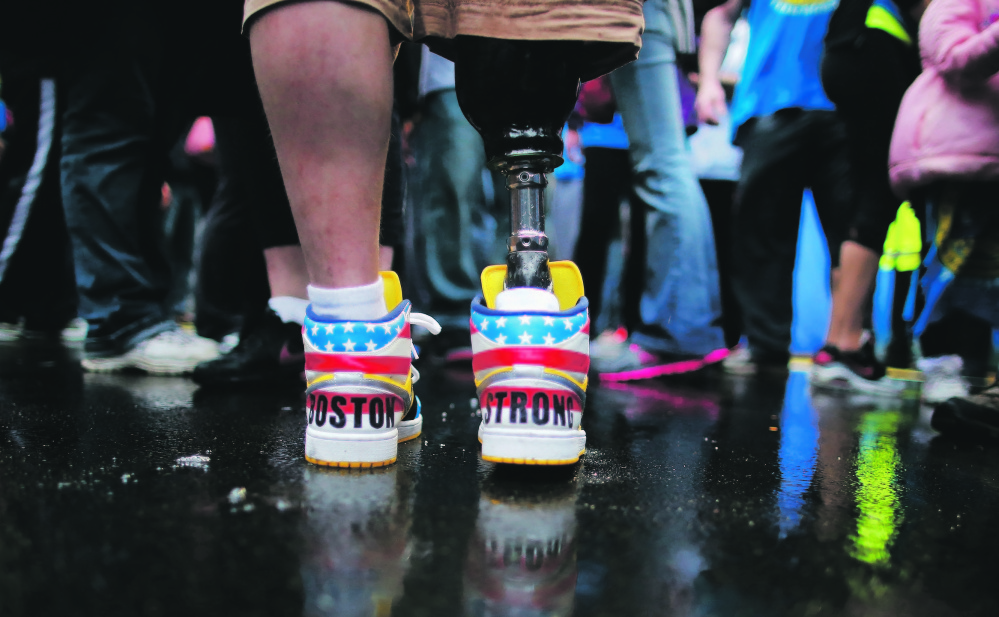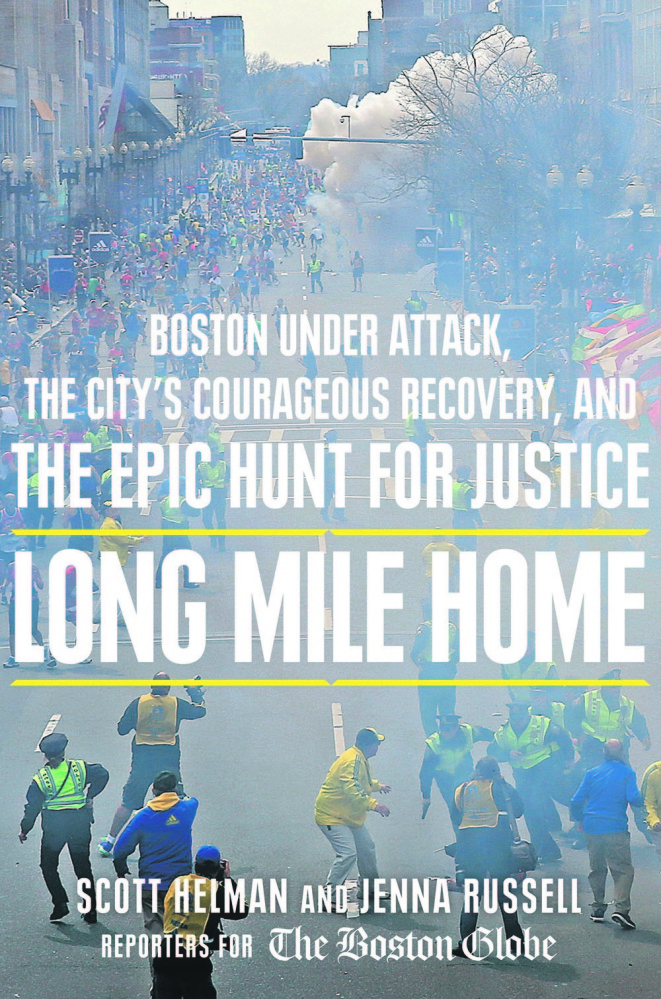As thousands of fans gather along Boylston Street to watch the Boston Marathon Monday, so many will think of the tragic end to last year’s race, when brothers allegedly set off two bombs and killed three people, badly injuring dozens more.
In their compelling recounting of the marathon bombing and the ensuing hunt for the Tsarnaev brothers, Scott Helman and Jenna Russell of the Boston Globe also look closely at how the victims – and the city – began to heal over the past year. Below, in an excerpt from “Long Mile Home,” they highlight the story of Shane O’Hara, owner of Marathon Sports. One of the bombs exploded just outside the store’s door, and the staff rushed to help those hurt.
This year, as in so many years past, the store will again be a gathering place for spectators at the heart of a celebration of community and resilience:
The woman, a stranger, walked in and handed him a Starbucks gift card. “You might need this,” she said. It was a small act of generosity, but it helped. The gift of hand-knit blankets helped, too, and the letters from schoolchildren in Kentucky and West Virginia. So did the wind chimes and painted ceramic hearts from the people of Newtown, Conn., still badly bruised from their own tragedy just months earlier. For Shane O’Hara and his staff at Marathon Sports, these and other gestures of kindness had helped them recover in the weeks after the first bomb exploded outside the front door. Their progress had been halting, but it had come. Focusing on the positive things seemed to hasten the pace.
There had been setbacks, too, including some insensitive comments from less conscientious visitors to the store. One of the first weekends after they reopened, a kid asked if the bombing had left limbs inside. O’Hara found the crassness shocking. At the end of June, he took a much-needed vacation with his family to their friends’ place on Hilton Head Island in South Carolina.
When he returned to work, he felt recharged and ready to go. Then, his first day back, someone came in and asked: “So, where did the bomb go off?” Just like that, his sense of peace and distance evaporated. It wasn’t that O’Hara and his colleagues refused to talk about what they had gone through that April afternoon. They just wanted people to show the tact and respect the subject deserved.
Every day, the Marathon Sports staff came to work on Boylston Street knowing the memories could be stirred at any time. If it wasn’t a customer’s remark, it was the TV trucks that gathered outside when the attack was back in the news. It was the curious tourists, visible through the store window, pausing at the site of the blast.
O’Hara knew the bombing had changed him. He had become quieter, his appetite for jokes and pranks not what it used to be. Maybe all that would come back, but a few months after one of the hardest days of his life, he couldn’t be sure. “I just want it to be over,” he said. “And it’s never going to be over.”
Boston, six months out from the bombing, had begun to move on, too. The passage, though, would be long. The marathon attack of 2013 would not fade easily, promising to linger indefinitely in the city’s consciousness.
Later, it would surely take its rightful place in history, on the timeline of local events that had shaped the world beyond: the launching of the 9/11 terror attacks from Logan Airport; the red state-blue state convention speech by Barack Obama in 2004; the racial tensions and school desegregation battles of the 1970s; the gangland killings under the reign of James “Whitey” Bulger; the ascension of the Kennedys to near royalty; the agitation of local abolitionists and revolutionaries; the midnight ride of Paul Revere; and the shot heard around the world that heralded American independence.
Remembering offered some choices. April 15, if you let it, could be defined by a heartless attack. Or it could be defined by the selfless work of Samaritans and first responders. It could mean cowardice, but it could also mean bravery. It could mean unimaginable losses, but it might also mean an unexpected breakthrough – a new perspective on what was important in life, a new kinship forged in a time of fear.
Of course, concentrating on the good stuff – the humanity and the strength – came easily for those not badly hurt or in mourning. The most severely wounded remained on their own distinct paths, each with his or her own unique map to recovery.
Celeste Corcoran, Jeff Bauman, Roseann Sdoia, Lingzi Lu’s family and friends – they and all the others would have to negotiate many ups and downs, hoping to reclaim, one day, a life that felt like their own again. Some would find peace; some would struggle. Others would dwell somewhere in between. There was no justice in any of it.
An hour before the bombs exploded on Boylston Street, the Red Sox had celebrated their walk-off win against Tampa Bay, courtesy of slugger Mike Napoli’s double off the Green Monster in the bottom of the ninth inning.
What the Sox couldn’t have known then, in their 12th game of 2013, was that this kind of win would define the season, a season of improbable comebacks, good humor, steady management, and unruly beards, ending with the most unlikely feat of all: winning the World Series on a cool Wednesday night in late October.
It was the team’s third championship in 10 years but its first won on home soil in nearly a century. Few had ever felt so right. Fireworks shot into the night sky, players soaked up the acclaim, champagne was prepared. But first, hearts turned to the April tragedy that had unfolded blocks away from Fenway Park.
“This is for you, Boston,” World Series MVP David Ortiz said over the public address system, hoisting the shiny trophy to the sky. “You deserve it.” The celebration carried into Thursday morning. Hundreds gathered on Boylston. Traffic stopped as fans knelt down in the darkness, touching and kissing the blue-and-yellow finish line.
Two days later, on a brilliant Saturday morning, the Red Sox climbed onto amphibious duck boats and rolled through downtown for their victory parade, hundreds of thousands of fans rejoicing along the route. When the procession reached Copley Square, left fielder Jonny Gomes climbed down onto Boylston with the World Series trophy, set it gently on the finish line, and draped it with a jersey that said 617 BOSTON STRONG. The crowd joined in singing “God Bless America.”
Shane O’Hara stood with the Sox players, tearfully accepting one of the jerseys. Initially he’d had misgivings about taking part in the brief ceremony. He wasn’t entirely comfortable being a public fact of Boston’s healing. He recognized the moment’s importance to the city, though, so he accepted his role. He was glad he did. Gomes pounded him warmly on the chest. Jarrod Saltalamacchia gave him a sincere hug.
The support felt good. In his slow recovery from April, another page had turned.
Send questions/comments to the editors.




Success. Please wait for the page to reload. If the page does not reload within 5 seconds, please refresh the page.
Enter your email and password to access comments.
Hi, to comment on stories you must . This profile is in addition to your subscription and website login.
Already have a commenting profile? .
Invalid username/password.
Please check your email to confirm and complete your registration.
Only subscribers are eligible to post comments. Please subscribe or login first for digital access. Here’s why.
Use the form below to reset your password. When you've submitted your account email, we will send an email with a reset code.